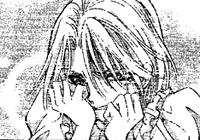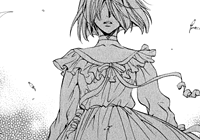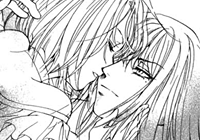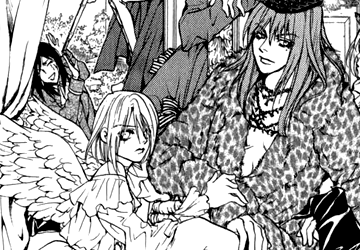Ever After
Lingering Feelings
Despite her early introduction in the series, Idike remains a singularity throughout the narrative in at least two ways: Firstly, she is the only bride candidate to make another actual appearance after the conclusion of her own fairy tale. Secondly, it is strongly implied that she is the only woman Lui holds genuine affection for — if not love. The reason she is mentioned again in later chapters even though she is not considered a recurring character (unlike, say, Lisette from Little Red Riding Hood) is that Lui keeps her in his memory, and the story acknowledges that.
Bluebeard
Just one chapter after Idike’s passing, Lui is checking out Amelia in Bluebeard, who has been promised to another man against her will. Willing to snatch the girl from the fangs of that man, Lui pursues the pair. When Wilhelm asks whether that questionable behaviour is motivated by love, Lui mocks him. He reasons that since he has been ordered to return with a bride, she should at least be to his liking (that is to say she should have a certain cup size to show), which has nothing to do with love.

Lui is written as a superficial character, especially on the outside, and to Wilhelm, his master’s obsession with the exterior is nothing new. These words, however, are followed by a wistful and pensive look on Lui’s face. The one I truly love is already beyond my reach…
, he thinks, as a silhouette of Idike appears in his mind. It is a very quiet and private moment, where both Lui and Idike are portrayed very tenderly, with Idike holding flowers.
The encounter with Idike may still be fresh on his mind because they have only just left what used to be the Briar Castle (Bluebeard is alluded to at the end of Little Briar Rose). Still, I think this scene can also be interpreted as Lui holding on to his feelings for her without intending to replace her spot in his heart, no matter how his journey ends.
Next, the second volume lists Idike with a character blurb on its introduction page, which serves to (re)familiarize readers. It is telling that Idike — despite not making a physical appearance in that volume — is deemed important enough to be featured up there with Lui and his companions. The blurb explicitly mentions Lui’s affection for Idike, and the scanlation even says that he started opening his heart to her
— certainly not a typical development as far as this self-absorbed prince is concerned.
Rapunzel
In the first chapter of volume two, Lui feels captivated by the titular Rapunzel and decides to get to know her, even though he cannot tell why he feels that way at first.

Rapunzel is moody, aggressive and violent, and seems all too willing to ditch her beloved (the young prince who regularly climbs her tower) to accompany Lui back to his kingdom instead. However, when Lui is about to free her from her imprisonment as she wished, she hesitates, her face distorting in anguish. It is in that moment that Lui remembers Idike’s crying face and understands why Rapunzel caught his attention.
Ah, I see… She somehow resembles her… in the habit of putting up a strong front. And yet, there is a sensitive and delicate side. So that’s why I was attracted to you.
To be honest, I do not see how Rapunzel’s first impression was supposed to resemble Idike as Rapunzel was choking a bird at that very moment, but I do love this epiphany and would say that after Little Briar Rose, Lui seems to be particularly taken by girls and women who try to hide their own pain.
Shortly afterwards, Rapunzel throws her prince out during a temper tantrum. As she gazes at him from atop the tower, she blames her long imprisonment on her parents, the bad fairy and her beloved. Lui murmurs that she is similar to Idike in that regard too, perhaps more so to himself than to Rapunzel, as he does not elaborate. It is a well-drawn comparison, as both Rapunzel and Idike seemingly push the blame on everyone except themselves to make their own situations more bearable, the contradiction being that even as they lash out at others, they wish to be rescued from that loneliness. Or, as Idike put it, for others to break through the thorns
— the ones they have set up themselves most of all.
When Rapunzel has another destructive fit of anger with dire consequences later on, Lui calls out to her:
“Rapunzel…! I knew a girl who was much like you.
This loss of control is feigned…! When you can’t accept things, you wail and throw a tantrum. How unreasonable… You test Silvio’s love, then judge him…
But that girl opened her eyes to the truth and fought. You, you aren’t even trying to accept his love or to love him.” You’re just waiting for a prince to climb that ladder…
This is such a sweet moment because Lui is openly speaking of Idike — Lui, who is usually loud, arrogant and pompous, and who does not care much what people may think of him, and whether or not they understand him. What’s more, he is doing so to reach out to someone in similar circumstances, even if his advice comes in the form of blunt criticism (as he did with Idike).
True enough, when Lui checks up on Rapunzel half a year later, she has managed to get her life in order thanks to his words, and has learned to love after giving birth to her children. In one of Lui’s gentle moments, he notes that she looks more charming than ever in her new-found happiness. He offers her the throne once more as he caresses her, and her response is one of my favourite moments in the series:
“But… Is this truly the hair that you wanted to stroke? …You were always looking into the distance. Don’t we both actually love someone else?”

Lui’s gaze reveals his surprise at her astute observation, and he smiles silently in defeat. What Rapunzel’s words prove is that after all this time, Idike is still in Lui’s heart. Understanding the pain of a love that does not come to fruition, he leads Rapunzel and her prince to each other again.
The Salt Princess
Surprisingly, Idike makes a return in the last volume during The Salt Princess, a multi-chapter tale that serves as the finale to the overarching plot. The witch Dorothea — the one who “cursed” Idike and contributed to her hundred-year-sleep — has been accompanying Lui on his quest, but now that he is in mortal danger, she has split from the group to carry out a secret mission. Unbeknownst to Lui, she returns to the former Briar Castle to seek out Idike.

Burying a thorn sapling in the soil, she awakens the dormant witch blood in the princess and pleads for help, as her own powers are not enough in the challenges to come. Idike, however, is not too pleased about being woken from her natural slumber. Her figure hovering ominously in the air, she tells Dorothea: I don’t know your intentions. But he is an arrogant man who thinks that the whole world revolves around him.
Dorothea, while not asking of the princess to forgive her, beseeches Idike to lend a hand for Lui’s sake, and confesses that it is in his presence alone that she feels at ease and can be herself. Sharing Dorothea’s feelings on this, Idike finally smiles and agrees to be taken to Lui’s side. It is quite the gorgeous scene because the focus is on both Idike and Lui’s bond as well as the mutual understanding and connection between Idike and Dorothea.

Many have tried to enter the Briar Castle.
But the only one I could be truly honest with… was him.
During the climactic all-out battle, a dragon rises as the ultimate threat, but Dorothea returns just in time to stop its rampage — with thorny vines that drain its magic powers. When Lui hears thorns
and magic
, he immediately thinks of Idike. It is her spirit that channels the thorns, and restrains the dragon so that it can be taken down. At the end of the battle, Idike’s spirit manifests at Lui’s side, calling out to him, and he responds in kind.
“You’re such a baby…
You always need someone to save you. Don’t ever make me come to a place like this again.
There’s no other woman in the world who can stand you like I do. When you give up searching for a princess, come to me. Because I’ll always be there for you.”

Lui gives her a melancholic smile and gently accepts her kiss before she vanishes again. Yes, I guess I’ll come one day… My sleeping beauty…
It may be a cliché romantic scene, but I like its sweetness, and how it shows two people who know without any doubt that they are significant to each other, even if they are far apart. (Not to mention how adorable it is that Lui, who is far from being a sentimental person, responds in this indulgent way.)
Ludwig Revolution is set in the land of fairy tales, so Idike “living on” as a spirit is not that strange of an idea. After this exchange, Idike appears again on the cover illustration of the final chapter, and in the ending illustration — as an angel at Lui’s side as his quest goes on.

And they lived happily ever after. ❤